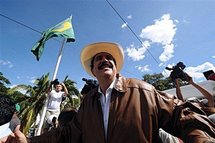Crisis talks collapse in Honduras
Noe Leiva
TEGUCIGALPA, Noe Leiva - Talks to resolve the political crisis in Honduras collapsed Friday over the de facto government's refusal to reinstate the ousted president, Manuel Zelaya.
Zelaya late Friday rejected a proposal that de facto leader Roberto Micheletti would step down if Zelaya gave up his claim to the presidency, after his envoys already said the talks were dead.

"We consider the dialogue has been exhausted, we cannot continue to give deadlines," said Mayra Mejia, a member of Zelaya's negotiating team.
Central America's worst political crisis in decades was set off by the June 28 arrest and ouster of Zelaya over his plans to change the constitution, which had upset the country's courts, Congress and business leaders.
Since his surprise return one month ago, the former rancher has been holed up in the Brazilian embassy, where occupants have reported growing pressure, including loud music and animal grunts being blared in this week.
Envoys for Micheletti said Friday that they were open to more talks, but remained firm on their position that Zelaya could not return to office.
"We'll accept for Roberto Micheletti to withdraw from the presidency if Mr. Jose Manuel Zelaya gives up his claims (to the presidency), giving way to a transition government of national reconciliation," negotiator Vilma Morales told a news conference.
Shortly afterwards, Zelaya told AFP that he rejected the proposal.
"It would be unseemly, indecent for the Honduran people if I was to negotiate on the position which they elected me to," Zelaya said.
Zelaya earlier called for help from the international community, which has widely condemned the coup.
"I'm waiting for calls from the United States, specifically the OAS (Organization of American States), the United Nations, and some contacts... especially countries in Central America," Zelaya told Radio Globo.
The United States, the country's main backer with a history of military intervention in the region, called on both sides to urgently reach a deal.
"I think that there is a real need for the two sides to -- to reach an agreement, and then implement it expeditiously," said State Department spokesman Ian Kelly.
The United States has suspended millions of dollars of aid to Honduras. It has also restricted visas to top members of the regime.
The de facto leaders appeared intent on pushing ahead with the November election, although regional governments warn they will not recognize the result and international bodies have said they will not help with monitoring.
"There need to be certain mechanisms put in place in advance of these elections," Kelly said Friday.
The main sticking point in crisis talks has been whether Zelaya can resume power before the election.
Zelaya's envoys this week rejected as "insulting" a proposal from Micheletti's team that the Supreme Court -- which accused Zelaya of 18 crimes ahead of the coup -- should rule on the issue.
Zelaya's term runs out in January.
--------------------------------------------------------------------------------------------------------------------------------